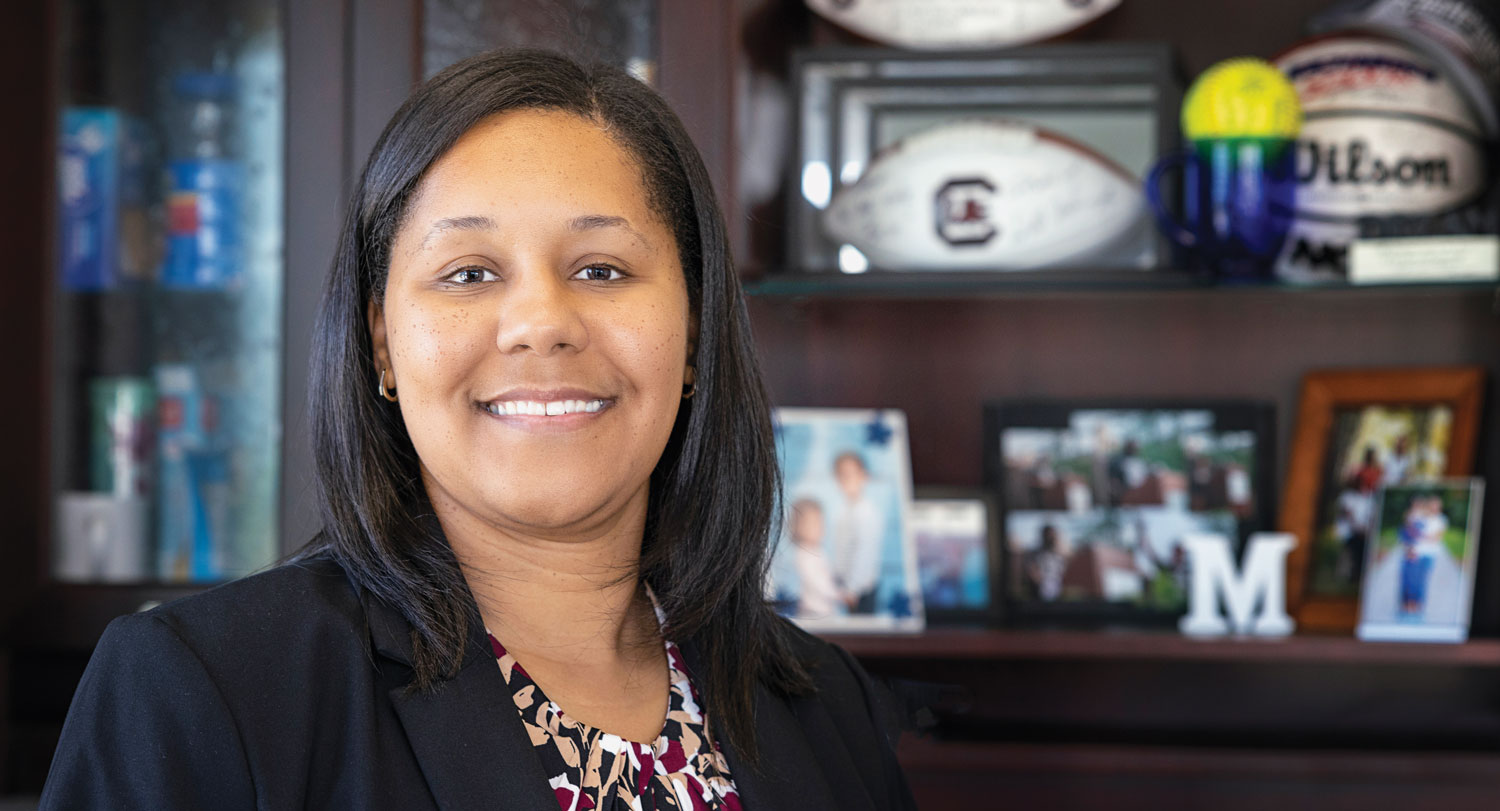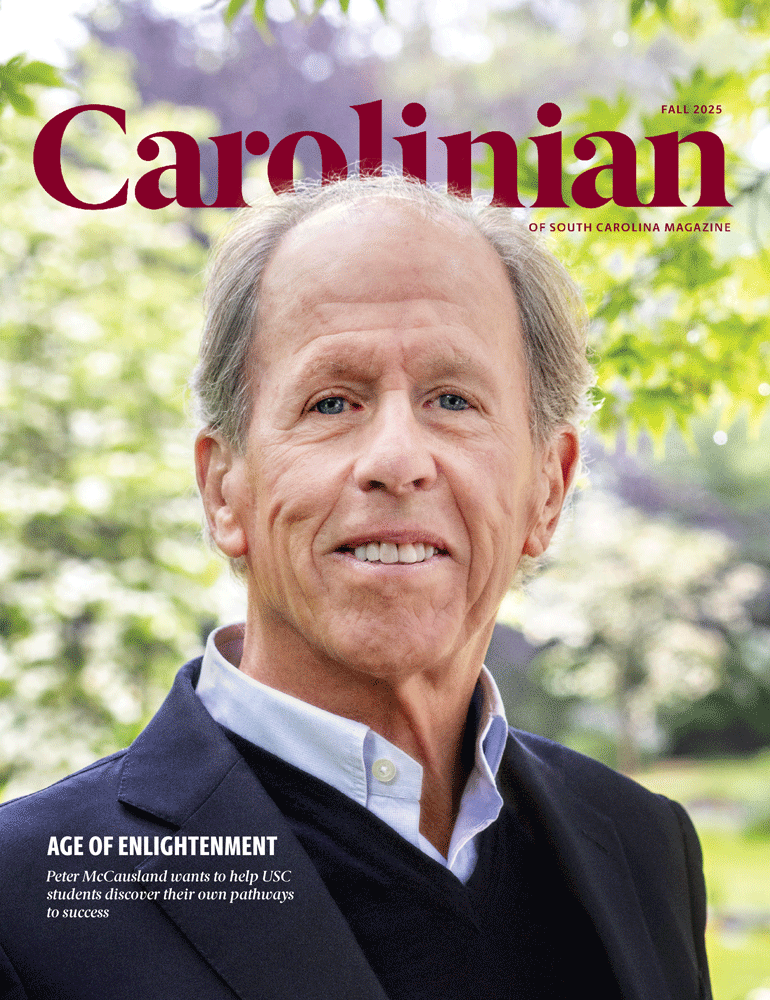
Maria Hickman wanted to be a teacher; college changed her plans. But in the 16 years
since she first came to USC as an academic advisor for the football program, the athletics
department’s current executive associate athletics director, chief diversity officer
and senior woman administrator has helped shaped plenty
of young minds.
And it all started with sports — basketball, in particular — which helped the Statesville, North Carolina, native pay for her education as a first-generation college student at Mars Hill.
“I knew I wasn’t going pro. Basketball was my way to have school paid for, so that my parents didn’t have to pay for it because I had three sisters,” she says. “Having a basketball scholarship took that burden off my parents.”
Basketball also gave Hickman a taste of success. Her senior year, after a series of ups and downs and multiple coaches, the Mountain Lions made a serious run at the Division II NCAA title. But winning isn’t everything, the onetime forward is quick to point out, and a successful senior season doesn’t automatically pave the way to a successful career off the court.
“I didn’t know what I wanted to do,” she says. “My senior year, we made it to the Elite Eight for Division II, so I’m just riding the wave. It was great year. We finally were winning. But before you know it, it’s over. I’m graduating and I’m like, ‘What am I going to do now?’”
It was the kind of existential question she would later help student athletes wrestle with at USC. And while she didn’t quite realize it yet herself, she was on the way to doing exactly that. “I knew I loved education, and I knew I loved sports,” she says. “I just needed to find my path.”
So she parlayed her degree in sport management into a master’s at University of Louisville.
She cut her teeth as an academic coordinator at University of Richmond, where she
advised student athletes in football, baseball, field hockey and lacrosse. She also
ran study hall and headed up the life skills program. “So, financial literacy, etiquette
dinners, community service — all of that fell under me
as well,” she says.
Richmond was a “three-person shop,” as she puts it, but having a hand in so many projects at once opened her eyes. When she arrived at USC in 2007, she had the confidence to succeed but also the skills to instill confidence in others.
“I didn’t know what I wanted to do. My senior year, we made it to the Elite Eight for Division II, so I’m just riding the wave. . .But before you know it, it’s over. I’m graduating and I’m like, ‘What am I going to do now?’”
Her impact grew in 2013, when she assumed leadership of the Dodie Anderson Academic Enrichment Center. It grew again in 2015, when she was promoted to senior associate athletics director for academics and student development. She assumed her latest administrative role in 2019 and also serves as sport administrator for women’s basketball and beach volleyball.
If you’re looking to quantify her impact over the years, you’ll find hard numbers in the USC’s Athletics Department’s GPA, which has been above 3.0 for 34 consecutive semesters. You could also check the President’s List, the Dean's Lists or the SEC Honor Roll — USC consistently puts up big numbers. But those aren’t the most important metrics, according to Hickman.
“It’s not about grades. It’s about students progressing to be better than they were than the day they walked in the door,” she says. “It’s great that we’ve had a 3.0 for 34 semesters, but that’s not my goal. My goal is graduation and making the students better people.”
It’s also about equipping them to make their own decisions. Following the 2020 death of George Floyd, for example, the athletics department held a series of town halls and Zoom calls with staff to discuss issues relating to race. And when the same conversations arose among student athletes, it was Hickman’s job to help them navigate a fraught political climate, particularly when it came to kneeling in support of Black Lives Matter.
“My job at that time was to go to each team, educate our students and listen. My job was to make sure they understood that our administration supported them, and if they chose to take a stance, what the public opinion might be: ‘If you choose to kneel, you’re going to have some naysayers. If you choose to stand, you still may have somebody ask why you didn’t kneel.’”
Most of her conversations when she worked as an advisor weren’t quite that heavy, of course, but to the student-athlete trying to navigate both the classroom and the playing field, the stakes are still plenty high, and Hickman consistently applied the same basic approach.
“It’s about listening,” she says. “Asking questions. Learning about their background. It’s meeting their parents. It’s taking the time to find out who they really are. Once they realize you care about them as a person — and it’s not just about the sport or just about the classroom — they’ll do anything for you.”
In her latest administrative role, she has a little less one-on-one contact with student-athletes, but her potential impact is greater. “At the end of my career, I want to know that I made people better, that I made a difference in students’ lives,” she says. “That’s it. That’s it.”
